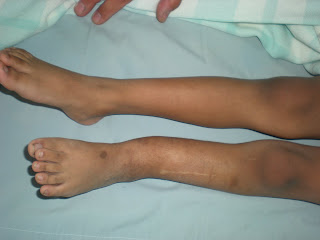Paulo was born with this rare bone disorder that causes one of leg to be bowed so badly that it spontaneously fractures. After the fracture, the circulation becomes compromised and the leg is not able to heal properly. This leaves a mangled, deformed limb with a sort of "false" joint.
Paulo came to Hospital Vozandes to visit his sweet grandmother who has been coming in for wound care every day for the past few weeks. He hobbled. I can't think of a better word for it. It wasn't a limp, it was more like he jumped from his right foot with his left foot only barely skimming the floor.
Paulo had surgery 3 years ago to correct his leg fracture. So, you ask, why was he still limping? Lack of follow up care. A team of docs who didn't know his case well enough. A surgeon with a "save the world in one week" mentality. Yeah, I know, this is where I'm starting to walk a fine line.
Cuban surgeons visited his little mountain town 3 years ago, saw his leg, took an x-ray, put an intramedullary pin through the bone, and went back to Cuba.

They didn't know, or didn't take the time to understand, that his was not a simple broken leg. Because of the compromised circulation that comes along with the disorder he has, his bone never healed. And they weren't around to know about the results of their surgery--which is what we had to deal with... a left leg 3 centimeters shorter than the right with a deformed "knob" of bone above the ankle.

We took out about 3 more centimeters of bone, and externally fixated it, so hopefully that segment will heal. In the next few years, Dr. Wolff will go back in to lengthen the bone below the knee. It may or may not work, but it's the only chance he has... otherwise they'll have to amputate below the knee.


Now don't get me wrong, I do think there's a time and place for short term international medical work. For example, taking over for a long term doc who needs a few weeks of vacation, going into an established hospital to teach a new surgical technique or donate a new piece of equipment and show them how it works, even going to work somewhere for a few days when you work with a local doctor who can give follow up care. But we all agreed when we got into this doctoring thing that we would "do no harm"... and sometimes fixing something, whether surgically or with a prescription, without being there to see how it results can be doing a lot more harm than if it hadn't been fixed at all. Just something I've been pondering... what do you think?





3 comments:
so true but hard....hard to make those choices. no chance they have electronic records yet? ;)
Yes this is a sad case where the history may have provided a better outcome. But how many other patients were helped permanently by the "save the world in one week surgeon"? Even with good follow up care, medical mistakes happen as proof to the fact that physicians are not infallible. How many ED patients in the US never get follow up care? Medicine is a "practice". At most we can only try to improve suffering and TRY to "do no harm", but unfortunately practice is not perfect and harm occasionally occurs. I think any effort to ease suffering wether long term or short term is noble.
very sobering, Kat. Something for each one of us who enjoys short-term missions to think long and hard about.
Post a Comment